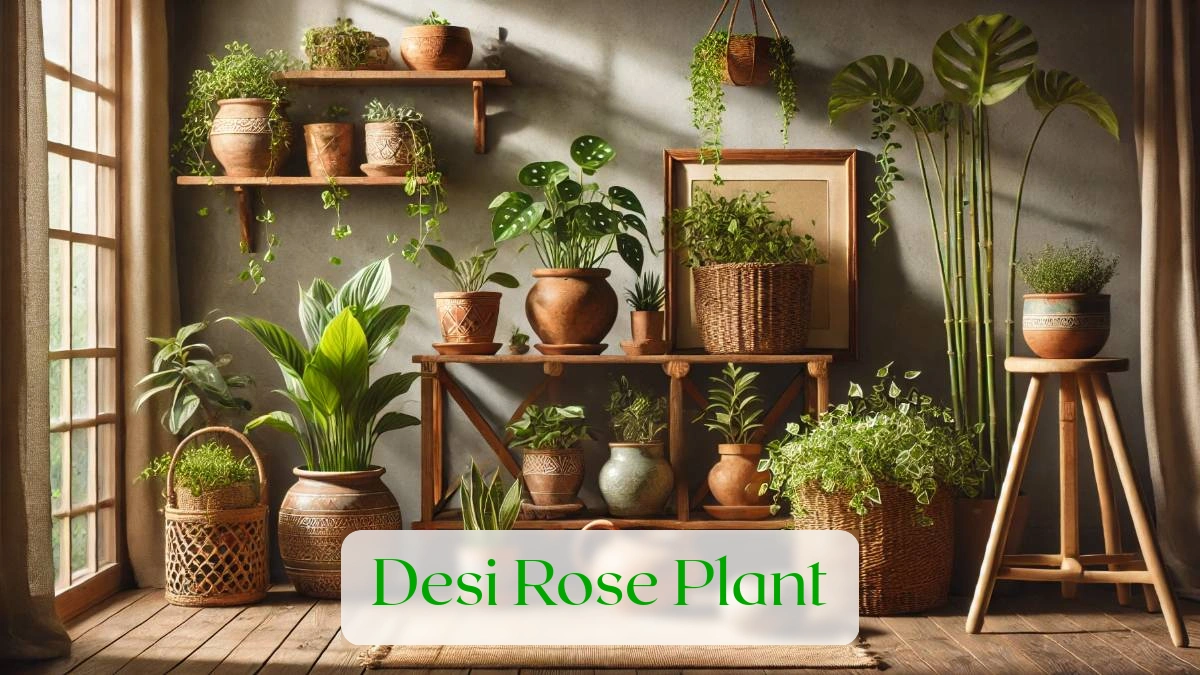Stunning Desi Roses: The Pride of Your Garden. This is your complete guide to growing breathtaking Desi roses in India. Learn the secrets to vibrant blooms, healthy growth, and minimal effort. This guide will help you cultivate the most gorgeous Desi rose plants in your Indian garden. Let’s unveil the magic behind these enchanting blossoms.
Choosing the Right Desi Rose Variety for Your Climate
India’s diverse climate means choosing the right Desi rose variety is crucial for success. Different varieties, such as Gulabi, Maratthi, and many others found regionally adapt better in distinct conditions.
- Understanding Desi Rose Types: Research the specific types popular in your area. Local nurseries are goldmines of information on what thrives locally.
- Climate & Soil Considerations: Desi roses, while hardy, need specific environments to flourish. Sun-loving varieties may struggle in shadier regions. Consider your region’s rainfall patterns, temperatures, and soil type—clay soils or sandy—when choosing your plants.
- Disease Resistance: Opt for disease-resistant varieties to prevent early disappointments. This minimizes your need for extensive chemical treatments.
Read more: tiger rose plant
Planting Your Desi Rose: A Step-by-Step Guide
Planting your Desi rose correctly sets the stage for vibrant blooms. Your preparation before planting will directly impact long-term cultivation.
- Location and Soil Prep: Choose a sunny spot with well-drained soil. Amend heavy clay soils with compost or organic matter to improve drainage, this prevents root rot common among roses. Prepare by tilling 12 inches down ensuring your space has the structural capability to support the roses.
- Planting Techniques: For cuttings, immerse the cut ends in rooting hormone (essential to facilitate quick rooting) and plant into a mix of potting soil before you can plant in the garden location—ensure it’s in a suitable humid environment. For seedlings, gently remove them from their containers, loosening the roots and taking care not to inflict major root shock and proceed similarly to the method involving cut rose stems mentioned before hand.
- Tools and Materials: You’ll need a trowel, watering can, and garden gloves and importantly potting mix (if establishing cuttings initially). Your overall plan will greatly depend on your preparation and if choosing to propagate from cuttings.
- Spacing: Allow adequate space between plants (roughly 2-3 feet) – this depends significantly on growing patterns related to specific plant selection chosen — enabling good air circulation and reducing the spread of diseases by improving air space management.
Nurturing Your Desi Rose: Watering, Fertilizing & Pruning
Consistent care ensures your Desi rose thrives as this can be a long-term process dependant on your efforts for managing disease as well.
- Watering Schedule: Water deeply and regularly in India’s climate. Regular inspections is key to managing soil dryness while observing for overly saturated conditions due to potential rainfall. The ideal state is well-drained, moderately moisture-dense soil as mentioned before.
- Fertilizing for Optimum Growth: Select high-quality fertilizer which includes minerals such as phosphate or potassium or even nitrogen-based fertilizers are key – specific amounts will be dictated depending on growth stages. Use a slow-release organic fertilizer or a balanced fertiliser (nitrogen (N) – Phosphorous (P)- Potassium(K) at around 10:15:10 in number content) according to recommendations, apply roughly once a month during bloom & in the active root/blossom seasons.
- Pruning Techniques: Regularly pruned plants are a well maintained system (ensure use of sanitized tools too) Pruning at growth points that support desired plant heights and structural formations is essential throughout your growth schedule— this can change according to plant structure developments & to maintain the necessary plant heights through active removal process to control growth as required for shaping & maintaining optimum blooms as needed—remove dead or diseased branches and maintain optimum branch heights. You could benefit from employing pruning in winter or the early sprouting period.
- Pest and Disease Protection: Inspect Regularly to detect diseases early. For any detection of any infestations. Using neem oil or insecticidal soap could allow controlling specific problem situations effectively such a aphids which could heavily harm bloom or even completely damage bloom cycles for roses. Natural practices is key where you can however depending on issues organic products need use too— consult local gardeners or specialist plant people who’re knowledgeable on roses (pest/disease management experts may also be necessary dependant on issues)
Read more: rainbow rose plant
Troubleshooting Common Desi Rose Problems
Even the most attentive gardener encounters challenges.
- Identifying diseases: Look for leaf spot symptoms, powdery mildew in which case removal of debris could be one control method for instance to deal proactively . Consulting a local expert at various growth stages could highly benefitial indeed overall with the additional benefits to know when to expect such challenges to address in planning in overall stages too.
- Dealing with Pests: Common pests include aphids and spider mites—use insecticidal soaps for controlling these; inspecting regularly to manage potential problem at earlier occurrence could improve overall growth results here of various sizes significantly. Using neem oil against aphid issues is a natural solution with potential use. Various additional solutions exist also organically.
- Addressing other Issues: Yellowing leaves can signal nutritional issues or water problems and to treat those situations amend your soil & provide appropriate amendments while water deeply based to solve that issue and make necessary soil improvements. Removing excess branches enables dealing actively in plant management processes with improved water delivery systems as necessary as it all relates on healthy water intake while also providing more light which provides good conditions for improving flower developments significantly too in plant operations.
Propagating Your Desi Rose Plants
Expanding your rose garden through careful techniques— you can achieve more variety while growing more effectively while also being economical without purchasing new stems repeatedly.
It’s important also that when transplanting these to keep in note when choosing to propagate methods the suitability for various methods depends greatly upon seasons & other climatic factors like humidity too— such factors will be essential key information considerations in practical terms of plant growth. This factor impacts choice & choice is essential to success also for growth & results overall.
- Propagation Methods: Cuttings work efficiently if performed correctly – ideally with fresh, young growth in a moist humid setting—or layers as alternatives if dealing various established plants – when layering parts of the rose bend branches and fix to maintain the desired layering form.
- Tips for Success: Ensure fresh sections without too far growths on such cuttings in maintaining hygiene is highly significant while creating ideal humidity while propagation for best plant growth results overall. The application of appropriate rooting hormones supports best rooting developments as well. Ensuring clean materials before handling with appropriate sterilizing too for various steps such as implements/tooling etc for handling too while propagation could enable the maintenance of better healthier plant developments after various growth stages significantly too in practical terms for operations overall involved during propagation steps. Monitoring regularly too makes you can observe & adjust growth according to these requirements for optimal settings conditions also in ensuring plant survival after transplantation overall involved which will involve different timings (it differs significantly dependant season factors relating to transplanting processes involved that might be involved during transplantation operations so check those carefully.)
- Caring for New Plants: Newly propagated rose plants need vigilant care— regular irrigation or even protection could mean difference.
Read more: small rose plant
FAQ
- How often should I water my Desi rose plant? Water deeply when the top inch of soil feels dry depending on various climates such differences (it significantly varies dependant location but inspecting and watering on noticing dryness is key, more significant in hotter places like much of India).
- What is the best fertilizer for Desi roses? While using fertilizers specific ratios in components depends on requirements for specific growths etc , you should consult an expert on recommendations appropriate but organic fertilizers generally suit most needs with slow releases, a balanced fertilizer (NPK 10:15:10 composition is most preferable ) with ratio at such settings is great especially through blooming seasons while actively using those balanced materials with these ranges that suit optimal balanced growths for various parts during plant activity cycles that’s essential during most important seasons such as blooming cycles most particularly.
- When is the best time to prune my Desi rose plants? Pruning happens ideally in early spring or late winter; however it can vary as you may decide pruning schedules also need adjust depending upon situation requirements due various situations/challenges presented by various diseases and needs can necessitate pruning operations that requires appropriate careful consideration especially according to problems with specific infestations or problems arising in such cases.
- How can I protect my Desi rose from extreme weather? Depending upon your prevailing climate for your areas, this ranges from protective barriers offering such shade to reduce problems caused from extremes of sunlight & too much temperature that could possibly make plants even experience burnout causing more troubles for growing if those climates experienced in severe forms are significant enough. Providing protective solutions is useful so protecting them reduces these heat shocks can prevent various problems when too much exposed direct heat issues for plant management issues could highly impact overall growths with effects due to harsh extremes that could then easily harm plant growth.
- What are some common Desi rose diseases and their treatments: Leaf spot, powdery mildew, black spot are some very common potential possibilities. In dealing with these kinds consult a specialized expert or research regionally. Often times, appropriate practices such as regularly removing excess branches/leaves or plant related material that could lead to fungal spores etc could also assist reducing various challenges these cause during certain active growing states as well that can vary with specific locations, different issues arising require some additional researches based on the climate in particular overall too that applies particularly in your specific climate conditions found.
Conclusion
Growing gorgeous Desi roses is a rewarding journey of creating magnificent flowers found in Indian gardens with unique regional variety choices to select available that thrive specifically regions within the overall geography too as that too relates conditions affecting various stages that make these plants successful for these areas that thrive regionally dependant on these conditions as such relating greatly even choice of cultivation & techniques too specifically accordingly in the climate conditions suitable especially overall too importantly that makes various regions to make overall success highly possible to have in certain settings in achieving great bloom successes during growths at various significant lifecycle plant management periods too as this greatly makes certain regional differences that relates growing plants especially for certain locations that these can even suit & thrives these significantly better that it impacts possibilities greatly through practical applications significantly too as regionally specific climate conditions is an essential factor highly impacting upon regionally selected specific plant management techniques highly crucial and greatly influencing even overall successfully achieved results greatly in these scenarios too.
Share your blooming Desi roses on social media and tag us! Let’s share the beauty of our Desi roses together! Don’t forget to share your experiences and ask any questions you may have in the comments section below. We’ll do our best to assist you in having a rewarding experience.



